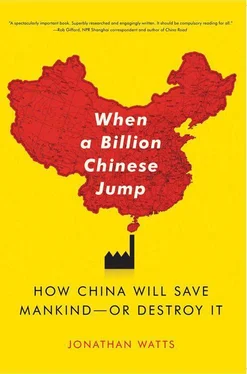Mao’s U-turn coincided with a remarkable moment in human history. Sometime around 1965–70 the fecundity of our species peaked. In that small window of time, just after the summer of love in the West and the Cultural Revolution in the East, the growth rate of mankind hit a high of 2.1 percent per year. After that it plunged by half. Our species was rapidly slowing down and aging.
The causes were both physical and social. China’s family-planning policies were a factor in Asia, along with the widespread introduction of the contraceptive pill in the West. But less obvious forces were also at work. After that peak, women became less fertile and men had lower sperm counts. The more wealthy and educated we became, the fewer children we were likely to have and the later in our lives they would be born. Half of us moved into cities. Instead of focusing on growth, more people were worrying about conservation and sustainability. Our species was showing all the signs of middle age. We were becoming less virile and less virulent. For those who believe James Lovelock’s Gaia Theory of the earth as a living organism, it was as though our numbers were being regulated. But whether it was by divine accident or human design, the trend was clearly downward.
In China, birth control was state policy, ruthlessly enforced. The reduction in population was dramatic. Though Mao flip-flopped repeatedly on family-planning policy, his successors introduced some of the most draconian targets in the modern world. In 1971, Premier Zhou Enlai launched a “birth planning” program as part of the socialist planned economy. Production of children, like grain or steel, became the subject of targets and quotas in the government’s five-year plan. Couples were told to marry later, limited to two or three children, and required to wait three to four years between births. 44
It worked. In the following decade the birthrate declined more precipitously than at any time before or since. 45But the government, advised by a group of rocket-scientists-turned-demographers, decided even this was not enough to slow the momentum of the population. In 1979, the State Council introduced an even tighter family-planning program, commonly but somewhat misleadingly known as the “one-child policy.” 46This required a mass mobilization that dwarfed later campaigns against SARS, HIV, or avian influenza, suggesting it was far tougher to contain people than any disease. Between 1971 and 2001, doctors carried out 151 million sterilizations and 264 million abortions, sometimes as late as the eighth month of pregnancy. 47The government is proud of the results. Without the family-planning policy, it estimates China would have an extra 300 million people, per capita GDP would be about a quarter lower, and the country would drain even more of the world’s resources. 48
Population restraint is good for the environment, 49but even in Henan, where the demographic pressures were shockingly apparent, I found it difficult to accept the violent means and distorted ends of China’s family-planning policy: forced abortions, property seizures, abductions of relatives, and the binding and handcuffing of pregnant women. 50In many parts of the world and other parts of China birthrates had fallen without such brutality. 51The family-planning policy also exacerbated traditional gender imbalances. Henan had one of the most skewed populations in China. The ratio of boys to girls was about 1.35 to 1. In some villages, it was above 1.5 to 1. This was largely because more girl fetuses were aborted here than anywhere else in the country. Demographers estimated there should be almost half a million more girls in the 0–4 age group in Henan. 52
The population crisis was not looming in Henan. It had already hit. Once fertile, the soil was losing nutrients through overfarming and floods that rubbed salt into the province’s wounds by salination. 53Farmers responded by pumping more chemical fertilizer into the soil than anywhere else in China. 54The lack of iodine and excess lead in the earth were blamed for lower-than-average IQ levels in the province. 55More farmland was irrigated by wastewater here than anywhere else in China, lowering yields, tainting produce, and posing serious health risks. As in Zhejiang, environmental problems in Henan were blamed for an increase in birth deformities. 56Aquifers were depleted as farmers and engineers dug ever deeper wells to find uncontaminated water. The population was fleeing in droves.
Malthus’s grim theory remains as relevant as ever. China’s population is on course to grow bigger and older over the next forty years. Worldwide, the demographic pattern is similar. As human numbers continue to swell, the globe will seem ever smaller, more crowded, and—as Yan described the land—more weary. Henan, then, is far from unique. In fact, it may prove to be a focus not of prejudice but of self-loathing. The despised, disasterprone province encapsulates not just what China is doing to its land but what overpopulation is doing to the planet.
The reckoning is still to come. In the years ahead, China’s family-planning policies will amplify existing demographic distortions still further. The country faces a future in which tens of millions of adult men will be unable to find a bride, in which one grandchild will have to look after two parents and four grandparents, and in which by the predicted population peak of 1.5 billion in 2030 the majority of people will be living in cities.
How will farmers cope with the growing hunger for food, the extra elderly relatives they will have to look after, and still find time to care for the soil? The one-child generation will need more machinery and more fuel. That will require greater exploitation of underground resources, because most of the heat and power in China comes from a single source. Coal.
10. The Carbon Trap
Shanxi and Shaanxi
When the age of decadence arrived, people cut rocks from the mountains, hacking out metals and jades. They extracted the pearls from oysters, smelted copper and iron ores… They hunted by setting the forests ablaze and fished by draining dry the pools.
—The Book of the Prince of Huainan 1
Cold, dark, silent. Close to death. Buried in the depths of a collapsed, illegal coal mine, Meng Xianchen and Meng Xianyou knew they had been given up for dead. 2
The rescue effort had been abandoned. The two brothers could no longer hear the sound of mechanical diggers, drills, and spades above their heads. Dismayed and exhausted, they had stopped yelling frantically for help.
How long had it been? Hours, days, weeks? There was no way of knowing. When their mobile-phone batteries died, they lost all track of time.
And place. With the silence and the darkness came disorientation. They were unsure which way led to the surface and which led deeper into the mountain. They had little evidence that they were even still alive. It was like being dead, but lost inside your own tomb.
Aboveground, their families were already preparing a funeral. In accordance with tradition, relatives had started burning “ghost money” for the two brothers to spend in the other world. Negotiations had begun with the local authorities about compensation. Yet down below, the Mengs stubbornly refused to die. Driven by a powerful instinct to survive, they fought against the earth and the darkness, against death itself.
The brothers started digging. They hacked and shoveled, using a single pick and their bare hands. They were only a few dozen meters from the surface, but despite twenty years of mining experience, they were so panicked and confused by the darkness that they started to worry they were tunneling deeper into the mountain. They changed direction once, twice, three times, before deciding to head straight up.
Читать дальше










